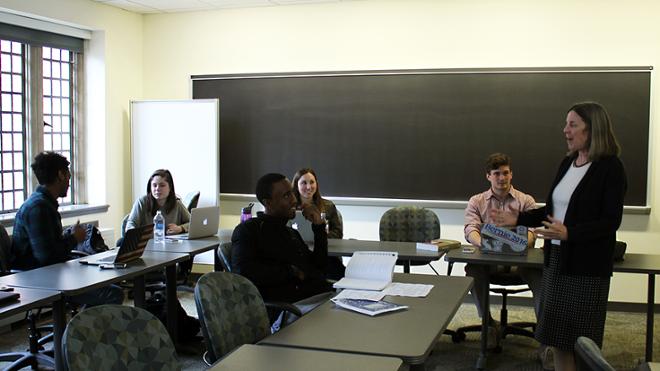A passion for nonprofits
When Ann Hodges and Phyllis Katz founded the Legal Information Network for Cancer in 1996, they learned a lot about the law relating to nonprofits. So much, in fact, that they decided to put their knowledge to good use by developing a law course. LAWE 771, Nonprofit Organizations, is the result; it “examines the nature, formation, governance, and operation of nonprofit organizations.” But it has another motive, too. “We wanted to encourage students to get involved with nonprofits after graduation,” said Hodges.
Robin McVoy, L’07, was in law school when she discovered Ring Dog Rescue, a Richmond-based organization dedicated to finding homes for pit-bull-type dogs. The group had just started to take shape, and wanted to become a non-profit. “It was a big motivator for me to take the class,” said McVoy. She used the knowledge she gained in the class to help Ring Dog Rescue through the process of becoming a 501(c)(3). Today, McVoy—whose full-time job is in-house counsel for the Federal Reserve—serves on two different non-profit boards. Through the Virginia Federation of Humane Societies, she helps the organization with their lobbying and educational efforts. With the Virginia Animal Fighting Task Force, she assists in the organization’s mission to protect animals through education, or organizing animal rescue. “As lawyers, we have a skill set that a lot of people need, and they can’t afford it,” said McVoy.
That’s part of what drove Hodges and Katz to create the class. “We just felt like this was an area that lawyers, in particular, need to know about,” said Hodges. “They often get asked to serve on boards and represent nonprofits.” Katz added, “What we hope to achieve is that they will bring good governance practices and encourage good management practices … as they go forward and serve their community.”
The earlier versions of the class, which started in 2005, had students working on a manual for nonprofit organizations—now one of the most frequently downloaded documents on the Richmond Law website—as well as helping two organizations achieve 501(c)(3) status. Eleven years later, the course is still going strong, but students are interacting with nonprofits in new ways. Instead of starting from scratch and helping an organization become a nonprofit, students are paired with a well-established local nonprofit to perform an audit of the organization. This year’s nonprofits include a mentoring group, a free health care clinic, an international ministry in Niger, and a school for children with disabilities. The students look at the articles of incorporation and the bylaws; they examine operational and governance practices; and at the end of the project, they make a report and recommendations, not only to the class but to the nonprofit itself. An important part of the project is to share with the class the passion for the mission that each organization has.
It’s this part of the class that, Hodges explained, “contextualized [students’] learning in a positive way.” In 2013, Hodges conducted a study on the impact of the course, with results that “overwhelmingly supported the conclusion that the experiential education projects incorporated in the class enhanced their learning and developed their skills, in addition to encouraging their involvement in nonprofit organizations after graduation.”
Noah Downs, L’15, agrees. He was assigned to work with Firehouse Theater when he took the nonprofit course. After he presented his findings to the class and to the Firehouse Theater leaders, they asked him if he wanted to be a member of the board. As a lifelong theater-lover, the position was a perfect fit for Downs, who works at Gavin Law Offices in Richmond. “It’s really been fascinating figuring out exactly what makes a nonprofit tick,” he said. Plus, “If I hadn’t been in that class, I would not have been able to help guide Firehouse to where it is today.”
Curtis Tomlin, L’14, put his nonprofit skills to work with the Virginia Saltwater Sportfishing Association, an organization that he helped usher through the process of becoming a 501(c)(3)—what he describes as “using my law degree to get my environmental fix.” Growing up fishing on the Chesapeake Bay, Tomlin was already passionate about the subject matter. The purpose of the organization would be to unite anglers on pertinent issues, while protecting jobs and ensuring sustainability of Virginia’s fisheries. While working as an attorney at Harvey & Williams in Richmond, he offered his services pro bono, helping the organization with their articles of incorporation and bylaws as well as their application for tax exempt status. “I see the need for this organization and I want to see it do well,” said Tomlin. “I wanted to give them the legal ground work to mobilize and accomplish the mission.”
And that attitude is one of the end goals of the class, explained Katz: “What we want the students to achieve from this laboratory experience … is a passion for the sector and a passion for the mission of that organization. The skills that will allow them to be future leaders in their community.”
